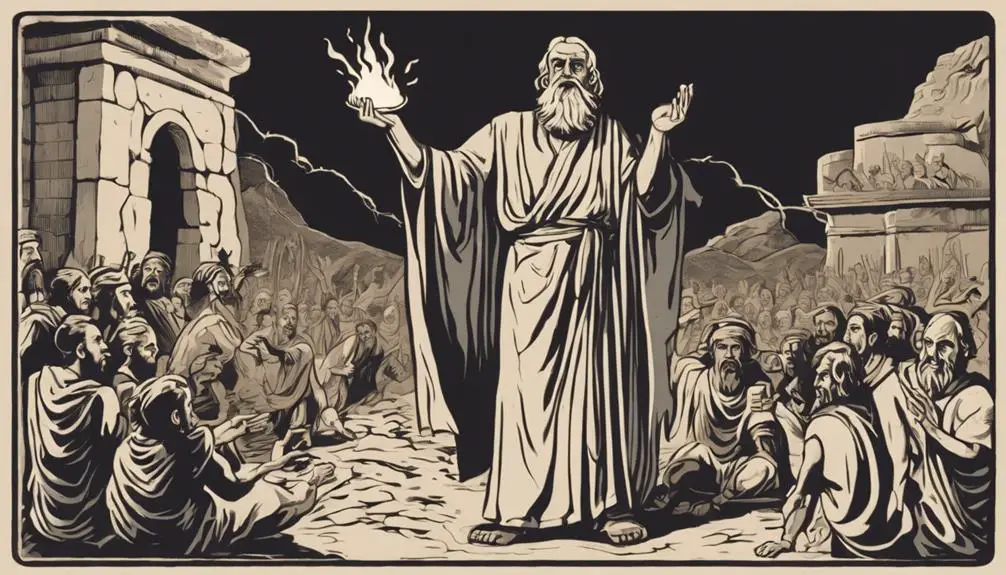Find out why a biblical prophet was commanded to eat poop, sparking curiosity and lessons beyond the initial shock.

Who Ate Poop in the Bible
Like a detective piecing together clues from an ancient mystery, you might find yourself intrigued by the biblical account of the Prophet Ezekiel's ordeal.
Tasked with performing a symbolic act of defiance, Ezekiel's diet was commanded to include a rather unconventional ingredient—poop. This startling directive, nestled within the pages of sacred scripture, raises eyebrows and questions about dietary commands, symbolic acts, and their consequences.
As you ponder the implications of this act and its interpretations, you're poised on the brink of uncovering reflections on divine judgments that resonate far beyond their initial shock value.
Why did this happen, and what can it teach us today?
Key Takeaways
- Prophet Ezekiel was commanded by God to eat bread baked over human excrement as a test of obedience and faith.
- Ezekiel's act of eating this bread symbolizes a profound prophetic message and defiance against societal norms.
- The ordeal underscores the gravity of his mission and role as a divine messenger, confronting cultural taboos.
- This act, while shocking, is meant to be understood within its cultural and theological context, symbolizing more than a physical act.
The Prophet Ezekiel's Ordeal

In the book of Ezekiel, the prophet faces a daunting command from God to eat bread baked over human excrement, showcasing a profound test of obedience and faith. This moment isn't merely about the physical act; it's a deeply symbolic gesture, steeped in the traditions of prophetic symbolism that permeates the Hebrew Bible. You're witnessing Ezekiel's resilience in the face of an act that, on the surface, seems to defy the very purity laws he's bound to uphold. Yet, it's this very resilience that underscores the gravity of his mission and the lengths to which he must go to fulfill his prophetic duties.
Ezekiel's ordeal speaks volumes about the nature of prophecy itself. It's a vivid illustration of the extreme measures prophets were sometimes called to undertake, serving as living symbols of God's message to His people. This act, unsettling as it may be, is imbued with deep spiritual significance. It's a dramatic representation of the impending defilement of the Israelites, forced to eat unclean food in exile. Through Ezekiel's compliance, you're compelled to reflect on the weight of divine commandments, the significance of symbolic acts, and the profound messages they convey.
Ezekiel's willingness to follow through with God's command, albeit with a concession to use cow's dung instead, highlights not just his obedience but his role as a conduit for divine messages. His actions embody prophetic symbolism at its most stark, challenging both him and his audience to confront uncomfortable truths about their spiritual state and the consequences of their actions.
Symbolic Act of Defiance

You'll find that the symbolic act of defiance, as exhibited in biblical narratives, often serves as a poignant critique of prevailing societal norms, challenging both the characters involved and their audiences to reconsider their values and beliefs. This form of rebellion symbolism, particularly in the context of consuming what's considered unclean or taboo, pushes boundaries and confronts cultural taboos head-on. It's not just about the shock value; it's a deliberate, thought-provoking statement against the status quo.
In the ancient world, dietary habits were deeply intertwined with cultural identity, religious practice, and social order. To deviate from these norms wasn't only to risk personal purity but also to symbolize a broader dissent against societal expectations. When biblical figures engaged in acts that violated these dietary norms, their actions were layered with meaning. It wasn't merely for the sake of rebellion but to signify a deeper spiritual or moral message. This defiance could symbolize a break from traditional values, a critique of contemporary leadership, or a call to return to true faithfulness.
Engaging with these narratives requires an understanding of the cultural and historical context in which they were written. The symbolism of rebellion against cultural taboos can be seen as a mirror, reflecting the tensions and conflicts within the society at the time. These acts of defiance challenge the audience to reflect on their own values and the societal norms they uphold, inviting a critical examination of what's considered pure or impure, sacred or profane.
Dietary Commands and Consequences

Reflecting on acts of defiance through dietary transgressions leads us to consider the specific commands surrounding food in biblical texts and their profound implications. These commands, often seen as divine laws, weren't only spiritual in nature but also had significant health implications. The biblical dietary laws, involving food taboos, weren't arbitrary but served multiple purposes including promoting hygiene, health, and distinguishing the people who followed them from others.
In the context of biblical narratives, violating these dietary commands often led to consequences that went beyond mere physical health issues. They served as lessons or messages, emphasizing the importance of obedience, purity, and the consequences of defying divine laws. Here's how these aspects are intertwined:
- Food taboos delineated what was considered clean and unclean, guiding followers in what they should and shouldn't consume. This wasn't just about diet but also about maintaining a spiritual and physical separation from practices considered impure or harmful.
- Health implications of following or not following these commands were significant, as many of the forbidden foods could lead to diseases or health issues. This aspect highlights a form of divine protection through dietary restrictions.
- Consequences for disregarding these dietary laws often went beyond personal health, affecting the individual's standing within their community and their relationship with the divine. Such acts were seen as rebellion against divine authority, leading to spiritual and sometimes communal repercussions.
Analyzing these dietary commands and their consequences reveals a complex interplay between faith, health, and identity in biblical texts.
Interpretations of the Act

To understand the act of consuming what's forbidden, one must delve into the cultural and theological layers that influence its interpretation. You're entering a realm where context is king, and the act itself can't be viewed through a modern lens without risking cultural misunderstandings. The Bible, a collection of texts from diverse times and cultures, often presents practices and punishments that seem alien to contemporary sensibilities. The act of eating feces, mentioned in the scripture, is laden with symbolic meaning and can't be interpreted literally without considering the cultural context in which it was written.
The hygiene implications of such an act are clear to modern readers: it's universally recognized as unsafe. However, in the biblical context, the act transcends its physical health risks. It serves as a potent symbol of defilement, punishment, or profound humiliation, deeply intertwined with the beliefs and customs of the time. You must remember that these narratives were crafted in a world vastly different from your own, where dietary laws played a significant role in defining purity, community, and identity.
Cultural misunderstandings arise when readers apply their contemporary values to interpret ancient texts. The act of eating feces, as shocking as it may sound, is wrapped in layers of metaphorical and theological significance that demand careful and informed analysis. You're tasked with peeling back these layers, understanding the cultural backdrop against which these texts were written, and appreciating the complexity of biblical symbolism without imposing modern judgments.
Reflections on Divine Judgments

Many instances in the Bible where people face divine judgments underscore a complex relationship between human behavior, divine will, and consequences. This narrative isn't just about shock value or the physical act; it's a profound exploration of divine retribution to maintain moral purity among the people.
You see, in the biblical context, divine judgments aren't arbitrary. They serve as a stark reminder of the covenant between the divine and humanity, where moral codes and societal norms are expected to be upheld. When breached, the consequences, as drastic as they may seem, are a form of divine retribution aimed at realigning the moral compass of the people.
- Divine Retribution: It's not merely punishment but a corrective measure. It seeks to restore balance and ensure that the principles of moral purity are respected.
- Moral Purity: This isn't just about personal virtue but encompasses societal norms and relationships. It's about maintaining a standard of conduct that honors the divine covenant.
- Human Behavior and Divine Will: The interplay between these two forces reflects the ongoing struggle to adhere to divine expectations. When human behavior strays, divine retribution is often depicted as a means to guide people back to the right path.
In reflecting on these divine judgments, it's crucial to approach them not with modern sensibilities but within the historical and cultural context of the times. They offer a unique lens through which to view the importance placed on moral purity and the lengths to which divine retribution might go to preserve it.
Frequently Asked Questions
What Are the Health Implications Mentioned in the Bible for Consuming Unclean Foods, Specifically in the Context of the Story Involving the Consumption of Poop?
You're exploring the health implications of consuming unclean foods, as outlined by dietary laws in the Bible.
Although it doesn't specifically dive into fecal transplants, the text warns against ingesting anything deemed unclean, which includes waste products.
This guideline suggests potential health risks associated with consuming such materials, advocating for strict dietary adherence to avoid illness.
It's a cautionary stance, emphasizing the importance of following these ancient dietary laws for well-being.
How Have Different Religious Traditions Outside of Judaism and Christianity Interpreted or Referenced the Story of Someone Eating Poop in the Bible?
Diving into the tapestry of global religious thought, you'll find Islamic perspectives and Hindu interpretations weave unique patterns around biblical narratives. They often offer reflective, analytical takes, respecting the original text while infusing their own spiritual insights.
Although the story you're curious about doesn't directly feature in their scriptures, scholars from these traditions might analyze it metaphorically, focusing on moral and spiritual purity rather than the literal act, enriching the dialogue across faiths.
Are There Any Archaeological or Historical Evidences That Suggest the Practice of Consuming Unclean Substances, Like Poop, as a Form of Protest or Defiance in Ancient Near Eastern Cultures?
You're diving into whether ancient Near Eastern cultures used eating unclean substances as protest or defiance. While direct evidence is scarce, you can infer from dietary laws and cultural symbolism that such acts would've been significant. These laws not only governed health but also social and spiritual purity.
Archaeological findings, though limited, hint at ritualistic defiance against oppression, using taboo practices to symbolize resistance or critique societal norms. It's a complex, nuanced area of study.
How Does Modern Psychology Interpret the Act of Eating Poop as Presented in the Bible, Especially in Terms of Human Behavior and Extreme Forms of Expression?
You're diving into the deep end, exploring how modern psychology views eating poop as an extreme form of expression.
This act, shrouded in psychological symbolism, reflects more than just a shocking behavior.
It's analyzed as a manifestation of extreme survival tactics or profound protest.
Understanding this, you're not just looking at a taboo subject but uncovering the layers of human psyche and resilience in the face of unimaginable choices.
In What Ways Has Contemporary Art or Literature Used the Motif of Eating Poop From the Bible to Comment on Modern Societal Issues or Themes?
You've probably noticed how contemporary art and literature often use shocking imagery to make a point.
The motif of consuming waste, without referencing specific biblical events, serves as a powerful artistic symbolism.
It's not just for shock value; it's a form of societal satire.
Artists and writers use this imagery to critique modern issues, from consumerism to environmental neglect, challenging us to reflect on our behaviors and societal norms in a deeply informed and respectful manner.
Conclusion
Intriguingly, as you explore the narrative of Ezekiel, you'll find a moment where divine instruction intersects with human limits, challenging our understanding of prophetic messages.
This act, eating food cooked over dung, symbolizes a profound defiance against oppression, mirroring the hardships faced by the Israelites.
Analyzing this, it's clear that such directives aren't merely punitive but deeply symbolic, inviting reflection on the nuanced ways divine judgments are conveyed.
It's a reminder of the complex relationship between divine commands and human interpretation, compelling us to look beyond the surface.



Sign up